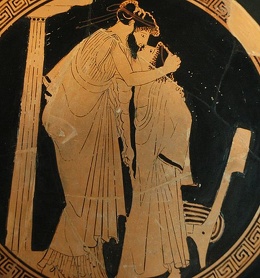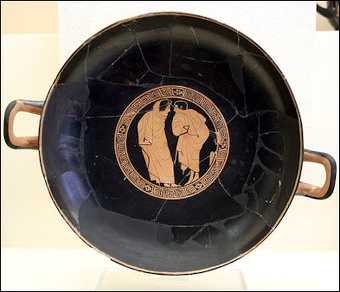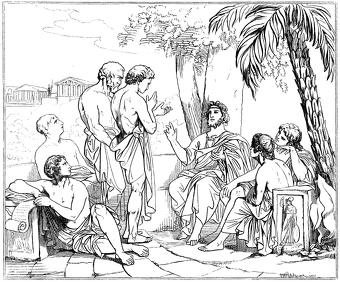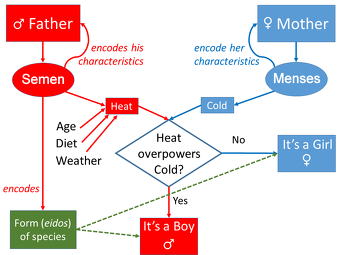Home | Category: People, Marriage and Society
LOVE IN ANCIENT GREECE
Some scholars claim that the idea of love began with the Greeks and the notion of romantic love began with chivalry in the Middle Ages. The ancient Greek poet Nimnerus wrote: "What is life, what is joy without golden Aphrodite?/ May I die when these things no longer move me?/ hidden love affairs, sweet nothings and bed."
According to a myth, described by Aristophanes is Plato's "Symposium", Zeus originally created three sexes: men, women and hermaphrodites. The hermaphrodites had two heads, two set of arms and two sets of genitals. Alarmed by their power, he separated each one in half: some became lesbians, some became male homosexuals and some became heterosexuals. Each felt incomplete and spent his or her life trying to track his or her other half down.
The playwright Arisphanes (446-386 B.C) expressed similar ideas. In an attempt define love he wrote: "Each of us when separated, having one side only, like a flat fish, is but the indenture of man, and he is always looking for his other half...And when one of them meets his other half, the actual half of himself, whether he be a lover of youth or of another sort, the pair are lost in amazement of love and friendship and intimacy, and will not be out of the other's sight, as I may say, even a moment...yet they could not explain what they desire in one another" other than "this meeting and melting into one another, this becoming one instead of two, was the very expression of an ancient need."
Plato (428-348 B.C.) espoused similar ideas. He viewed lovers as incomplete halves who could not find peace until they found each other. His ponderings in The “ Symposium” , a banquet staged in honor of Eros, are the oldest known attempt to systematically unravel the mysteries of love. In “ The Republic” , Plato wrote about marriage mainly as a means of reproduction while he wrote about the erotic loves in “ Symposium” in "blushingly romantic terms."
According to the World History Encyclopedia: Love, sex, and marriage in ancient Greece are portrayed in Greek literature as distinct, yet closely intertwined, elements of life. For many upper-class men, marriages did not take place for love, and other relationships, be it with men or other women, took on this role. Due to this, a lot of the literature discussing love is about the relationships men had outside marriage, often pederastic relationships. For women, marriage was a social and financial decision made by their father and, particularly in classical Athens, women were expected to stay indoors so as to avoid any accusations of infidelity. [Source World History Encyclopedia]
See Separate Articles: ANCIENT GREEK MARRIAGE: CONTRACTS, COUSINS AND DIVORCE europe.factsanddetails.com ; FAMILY LIFE IN ANCIENT GREECE: WIVES, ROLES, KIDS europe.factsanddetails.com ; ANCIENT GREEK WEDDINGS: RITES, BANQUET, PROCESSION europe.factsanddetails.com
RECOMMENDED BOOKS:
“Eros the Bittersweet” by Anne Carson (1986) Amazon.com;
“If Not, Winter: Fragments of Sappho” by Sappho, translated by Anne Carson Amazon.com;
“Stung with Love: Poems and Fragments" (Penguin Classics) by Sappho Amazon.com;
“Love Life of the Ancient Greeks” by Sofia A Souli (2018) Amazon.com;
“Love in Ancient Greece” by Robert Flacelière (1962) Amazon.com;
“In the Orbit of Love: Affection in Ancient Greece and Rome” by David Konstan (2018) Amazon.com;
“Ancient Greek Love Magic” by Christopher A. Faraone (2001) Amazon.com;
“Intimate Lives of the Ancient Greeks” by Stephanie L. Budin (2013) Amazon.com;
“Marriage to Death: The Conflation of Wedding and Funeral Rituals in Greek Tragedy” (Princeton Legacy Library) by Rush Rehm (2019) Amazon.com;
“The Family in Greek History” by Cynthia B. Patterson (2001) Amazon.com;
“The Ancient Family” by Numa Denis Fustel de Coulanges (1830-1889) Amazon.com;
“Women in Ancient Greece” by Susan Blundell (1995) Amazon.com;
“Women in Ancient Greece: A Sourcebook” by Bonnie MacLachlan (2012) Amazon.com;
“Coming of Age in Ancient Greece: Images of Childhood from the Classical Past”
by Jenifer Neils , John H. Oakley , et al. (2003) Amazon.com;
“Daily Life of the Ancient Greeks” (The Greenwood Press Daily Life Through History Series) by Robert Garland (2008), Amazon.com;
“The Home Life of the Ancient Greeks” (Classic Reprint) by Alice Zimmern (1855-1939) Amazon.com;
“The Greeks: Life and Customs” by E. Guhl and W. Koner (2009) Amazon.com;
“The Life of the Ancient Greeks, With Special Reference to Athens”
by Charles Burton (1868-1962) Amazon.com;
“Handbook of Life in Ancient Greece” by Leslie Adkins and Roy Adkins (1998) Amazon.com;
Love
Simon May wrote in the Washington Post: “Only since the mid-19th century has romance been elevated above other types of love. For most ancient Greeks, for example, friendship was every bit as passionate and valuable as romantic-sexual love. Aristotle regarded friendship as a lifetime commitment to mutual welfare, in which two people become “second selves” to each other. [Source: Simon May, Washington Post, February 8, 2013. May, the author of “Love: A History,” is a visiting professor of philosophy at King’s College London]
“The idea of human love being unconditional is also a relatively modern invention. Until the 18th century, love had been seen, variously, as conditional on the other person’s beauty (Plato), her virtues (Aristotle), her goodness (Saint Augustine) or her moral authenticity (the Swiss philosopher Jean-Jacques Rousseau). Even Saint Thomas Aquinas, perhaps the greatest of all Christian theologians, said we would have no reason to love God if He weren’t good.
Many of the great thinkers of love acknowledged its mortality. Aristotle said that love between two people should end if they are no longer alike in their virtues. Even Jesus seemed to suggest that God’s love for humanity isn’t necessarily eternal. After all, at the Last Judgment, the righteous will be rewarded with the Kingdom of God — with everlasting love — but those who did not act well in their lives will hear the heavenly judge say: “You that are accursed, depart from me into the eternal fire prepared for the devil and his angels.” And Jesus adds: “These will go away into eternal punishment.”
Ancient Greek Words for Love
Ancient Greek philosophy distinguishes between different conceptual forms and has distinct words for the modern English word love: Though there are more Greek words for love, variants and possibly subcategories, the main ones are:
Agape means "love, especially unconditional love, charity; the love of God for person and of person for God". Agape is used in ancient texts to denote unconditional love, and it was also used to refer to a love feast. Agape is used by Christians to express the unconditional love of God for His children. This type of love was further explained by Thomas Aquinas as "to will the good of another". [Source Wikipedia]
Eros means "love, mostly of the sexual passion". Although eros is initially felt for a person, with contemplation it becomes an appreciation of the beauty within that person, or and may ultimately transcend particulars to become an appreciation of beauty itself, hence the concept of platonic love to mean "without physical attraction". In Plato's Symposium, Socrates argues that eros helps the soul recall its inherent knowledge of ideal beauty and spiritual truth. Thus, the ideal form of youthful beauty arouses erotic desire, but also points toward higher spiritual ideals.
According to the Internet Encyclopedia of Philosophy: The term eros is used to refer to that part of love constituting a passionate, intense desire for something; it is often referred to as a sexual desire, hence the modern notion of “erotic” (Greek erotikos). In Plato‘s writings however, eros is held to be a common desire that seeks transcendental beauty-the particular beauty of an individual reminds us of true beauty that exists in the world of Forms or Ideas
Philia means "affectionate regard, friendship", usually "between equals". It is a dispassionate virtuous love. In Aristotle's Nicomachean Ethics, philia is expressed variously as loyalty to friends ("brotherly love"), family, and community; it requires virtue, equality, and familiarity.
Storge means "love, affection" and "especially of parents and children". It is the common or natural empathy, like that felt by parents for offspring. It is rarely used in ancient works, almost exclusively to describe family relationships. It may also express mere acceptance or tolerance, as in "loving" the tyrant. It may also describe love of country or enthusiasm for a favorite sports team.
Philautia means "self-love". To love oneself or "regard for one's own happiness or advantage" has been conceptualized both as a basic human necessity and as a moral flaw, akin to vanity and selfishness, synonymous with amour-propre or egotism. The Greeks further divided this love into positive and negative: one, the unhealthy version, is the self-obsessed love, and the other is the concept of self-compassion. Aristotle also considers philautia to be the root of a general kind of love for family, friends, the enjoyment of an activity, as well as that between lovers.
Xenia is an ancient Greek concept of hospitality, "guest-friendship", or "ritualized friendship". It was a social institution requiring generosity, gift exchange, and reciprocity. Hospitality towards foreigners and traveling Hellenes was understood as a moral obligation under the patronage of Zeus Xenios and Athene Xenia. Many understand the Odyssey as a story principally concerned with the concept. For instance, the failure of the Suitors of Penelope to appropriately welcome disguised Odysseus into his own home can be seen as justification for their subsequent demise.
Plato on Love
Romantic love is addressed extensively in ancient Greek philosophy and poetry. Some argue that the idea of soulmates originated in Plato’s Symposium. In his Symposium, Plato speaks of love as an overwhelming force that brings two people together. Plato mainly focuses on relationships that existed between an adult male and a teenage boy. These relationships were regarded as normal amongst the upper class, and the nature of the relationship is educative, but with a sexual element. [Source World History Encyclopedia]
According to the Stanford Encyclopedia of Philosophy: Plato discusses love (erôs) and friendship (philia) primarily in two dialogues, the Lysis and the Symposium, though the Phaedrus also adds significantly to his views. In each work, Socrates as the quintessential philosopher is in two ways center stage, first, as a lover of wisdom (sophia) and discussion (logos), and, second, as himself an inverter or disturber of erotic norms. Plato’s views on love are a meditation on Socrates and the power his philosophical conversations have to mesmerize, obsess, and educate. [Source Stanford Encyclopedia of Philosophy]
In the Symposium, the playwright Aristophanes (450–388 B.C.) gives an often quoted speech about love. After he told story about Zeus and the Three Sex described above, he said, “let us exhort all men to piety, that we may avoid evil, and obtain the good, of which Love is to us the lord and minister; and let no one oppose him—he is the enemy of the gods who opposes him. For if we are friends of the God and at peace with him we shall find our own true loves, which rarely happens in this world at present...My words have a wider application — they include men and women everywhere; and I believe that if our loves were perfectly accomplished, and each one returning to his primeval nature had his original true love, then our race would be happy. And if this would be best of all, the best in the next degree and under present circumstances must be the nearest approach to such an union; and that will be the attainment of a congenial love.
For more on this See “Plato on Friendship and Eros” in the Stanford Encyclopedia of Philosophy plato.stanford.edu/entries/plato-friendship
Aristotle on Love
Aristotle explore the concept of philia — a fondness and appreciation of the other. According to the Internet Encyclopedia of Philosophy: For the Greeks, the term philia incorporated not just friendship, but also loyalties to family and polis-one’s political community, job, or discipline. Philia for another may be motivated, as Aristotle explains in the Nicomachean Ethics, Book VIII, for the agent’s sake or for the other’s own sake. The motivational distinctions are derived from love for another because the friendship is wholly useful as in the case of business contacts, or because their character and values are pleasing (with the implication that if those attractive habits change, so too does the friendship), or for the other in who they are in themselves, regardless of one’s interests in the matter. The English concept of friendship roughly captures Aristotle’s notion of philia, as he writes: “things that cause friendship are: doing kindnesses; doing them unasked; and not proclaiming the fact when they are done” (Rhetoric, II. 4). [Source Internet Encyclopedia of Philosophy]
Aristotle elaborates on the kinds of things we seek in proper friendship, suggesting that the proper basis for philia is objective: those who share our dispositions, who bear no grudges, who seek what we do, who are temperate, and just, who admire us appropriately as we admire them, and so on. Philia could not emanate from those who are quarrelsome, gossips, aggressive in manner and personality, who are unjust, and so on. The best characters, it follows, may produce the best kind of friendship and hence love: indeed, how to be a good character worthy of philia is the theme of the Nicomachaen Ethics. The most rational man is he who would be the happiest, and he, therefore, who is capable of the best form of friendship, which between two “who are good, and alike in virtue” is rare (NE, VIII.4 trans. Ross). We can surmise that love between such equals-Aristotle’s rational and happy men-would be perfect, with circles of diminishing quality for those who are morally removed from the best. He characterizes such love as “a sort of excess of feeling”. (NE, VIII.6)
Friendships of a lesser quality may also be based on the pleasure or utility that is derived from another’s company. A business friendship is based on utility–on mutual reciprocity of similar business interests; once the business is at an end, then the friendship dissolves. This is similar to those friendships based on the pleasure that is derived from the other’s company, which is not a pleasure enjoyed for whom the other person is in himself, but in the flow of pleasure from his actions or humour.
The first condition for the highest form of Aristotelian love is that a man loves himself. Without an egoistic basis, he cannot extend sympathy and affection to others (NE, IX.8). Such self-love is not hedonistic, or glorified, depending on the pursuit of immediate pleasures or the adulation of the crowd, it is instead a reflection of his pursuit of the noble and virtuous, which culminate in the pursuit of the reflective life. Friendship with others is required “since his purpose is to contemplate worthy actions… to live pleasantly… sharing in discussion and thought” as is appropriate for the virtuous man and his friend (NE, IX.9). The morally virtuous man deserves in turn the love of those below him; he is not obliged to give an equal love in return, which implies that the Aristotelian concept of love is elitist or perfectionist: “In all friendships implying inequality the love also should be proportional, i.e. the better should be more loved than he loves.” (NE, VIII, 7,). Reciprocity, although not necessarily equal, is a condition of Aristotelian love and friendship, although parental love can involve a one-sided fondness.
For the complete article from which the material here is derived see “Philosophy of Love” in the Internet Encyclopedia of Philosophy utm.edu/love
Sappho
Sappho wrote sensuously about love between females. The word "lesbian" comes from her home island of Lesbos. Born in 610 B.C. in Lesbos, off of Asia Minor, she was probably from a noble family and her father was probably a wine merchant. Little is known about her because she didn't write much about herself and few others did.
In Sappho's time, Lesbos was inhabited by the Aeolians, a people known for free thinking and liberal sexual customs. Women had more freedom than they did in other places in the Greek world and Sappho is believed to have received a quality education and moved in intellectual circles.
Sappho formed a society for women in which women were taught arts such as music, poetry and chorus singing for marriage ceremonies. Although the relationship between Sappho and the women in her society is unclear she wrote about love and jealousy she felt for them. In spite of this, she had a child named Kleis and may have been married.
See Sappho Under GREEK POETRY europe.factsanddetails.com
Ancient Greek Love Tablets
A curse that focuses on erotic love found on a potsherd perhaps heated in a ritual read: “Burn, torch the soul of Allous, her female body, her limbs, until she leaves the household of Apollonius. Lay Allous low with fever, with unceasing sickness, lack of appetite, senselessness.”
The text of one Greek curse found rolled up in the mouth of a red-haired mummy found in Eshmunen in Ptolemaic Egypt read: “Aye, lord demain, attract, inflame, destroy, burn, cause her to swoon from love as she is being burnt, inflamed. Goad the tortured soul, the heart of Karosa...until she leaps forth and comes to Apalos...out of passion and love, in this very hour, immediately. Immediately, quickly, quickly...do not allow Karosa herself...to think of her [own] husband, her child, drink, food, but let her come melting for passion and love and intercourse, especially yeaning for the intercourse of Aapalos.”
One tablet addressed to a ghost goes: “Seize Euphemia and lead her to me Theon, loving me with mad desire, and bind her with unloosable shackles, strong ones of adamantine, for the love of me, Theon, and do not allow her to eat, drink, obtain sleep, jest or laugh but make her leap out...and leave behind her father. Mother, brothers, sisters, until she comes to me...Burn her limbs, live, female body, until she comes to me, and not disobeying me.”
Love Spells in Ancient Greece
John Opsopaus of hermetic.com wrote: “Most of the spells from the magical papyri here were discovered in Egypt the nineteenth century and brought together as part of the Anastasi Collection. It is quite likely that many of the papyri come from a single source, perhaps a tomb or temple library, and it is commonly supposed that they were collected by a Theban Magician. In any case, they are one of the best sources of Greco-Egyptian magic and religion.” [Source: John Opsopaus, Papyri Graecae Magicae hermetic.com |+|]
Love Salve: Hawk's Dung; Salt, Reed, Bele Plant. Pound together. Anoint your Phallus with it and lie with the Woman. If it is dry, you should pound a little of it with Wine, anoint your Phallus with it, and lie with the Woman. Very Good. [Papyri Demoticae Magicae xiv.1155-62]
Love Spell: “Aphrodite's Name, which becomes known to No One quickly, is NEPHERIE'RI [i.e. Nfr-iry.t, “the beautiful eye”, an epithet for Aphrodite/Hathor] - this is the Name. If you wish to win a Woman who is beautiful, be Pure for 3 days, make an offering of Frankincense, and call this Name over it. You approach the Woman and say it seven times in your Soul as you gaze at her, and in this way it will succeed. But do this for 7 days. [Papyri Graecae Magicae IV.1265-74] |+|
Dating and Interactions Between Young People in Ancient Greece
The boyhood of the young Athenian was occupied by school and play; his youth was spent in gymnastic exercises, and sometimes also in scientific studies and military labours. When he attained his majority as a citizen, he acquired the right of exercising his political and civic duties, taking part in popular assemblies and other public gatherings; but apparently the young people did not make much use of these privileges when they first entered on their political majority. Besides these occupations there were many others to draw them away from serious duties: pleasant intercourse with companions, drinking bouts, and also the charms of pretty hetaerae, who were easily won to regard with favor anyone possessing a tolerably well-filled purse. And this was all the compensation they had for exclusion from the society of the daughters of citizens; for, with the exception of the hetaerae, and the flute and cithara players who performed at the banquets, women played no part in social intercourse at Athens. [Source “The Home Life of the Ancient Greeks” by Hugo Blümner, translated by Alice Zimmern, 1895]
There were but few occasions when the girls left the close confinement of the women’s apartments for any kind of publicity, and this custom, which resembled the Oriental, and was probably introduced by the Ionic Greeks from Asia Minor, while the Doric practice was very different, caused one of the greatest wants of Attic life. This is brought forcibly before us in the comedies of the fourth century, the so-called “New Attic Comedy,” in which the basis was usually a love story, which our modern ideas would regard as purely sensual, or even immoral; while love, in the best sense of the word, is never represented.
We must not, on this account, suppose that the Greeks were entirely unacquainted with that kind of affection which is based on real inclination, similarity of mind, and recognition of intellectual virtues; in fact, the contrast often emphasised by poets and artists between Aphrodite Urania, as the type of heavenly intellectual love, and Aphrodite Pandemos, as that of sensuous love, must convince us of the contrary; while Greek literature also supplies many examples of pure love in the truest sense of the word, though a strong admixture of the sensuous element was natural, even here, to a passionate southern race.
It was, however, quite unusual for such attachment to begin before marriage, since opportunities for this were wanting. But often, in spite of the conventional mode by which marriages were arranged, this attachment was developed after marriage, and we must not fall into the mistake of judging married life in Greece, or especially at Athens, only from the greatly exaggerated descriptions of Aristophanes, or the sarcastic tirades of misogynists like Euripides. The great majority of the women were not so superficial or so quarrelsome as these poets have represented them, nor the young men, as a rule, so vicious or hostile to marriage as they are depicted in the majority of the New Attic Comedies.
See Adolescent Sex in Ancient Greece Under SEX IN ANCIENT GREECE europe.factsanddetails.com
Image Sources: Wikimedia Commons, The Louvre, The British Museum
Text Sources: Internet Ancient History Sourcebook: Greece sourcebooks.fordham.edu ; Internet Ancient History Sourcebook: Hellenistic World sourcebooks.fordham.edu ; BBC Ancient Greeks bbc.co.uk/history/; Canadian Museum of History, Perseus Project - Tufts University; perseus.tufts.edu ; MIT Classics Online classics.mit.edu ; Gutenberg.org, Metropolitan Museum of Art, National Geographic, Smithsonian magazine, New York Times, Washington Post, Live Science, Discover magazine, Natural History magazine, Archaeology magazine, The New Yorker, Encyclopædia Britannica, "The Discoverers" and "The Creators" by Daniel Boorstin. "Greek and Roman Life" by Ian Jenkins from the British Museum, Wikipedia, Reuters, Associated Press, The Guardian, AFP and various books and other publications.
Last updated September 2024





